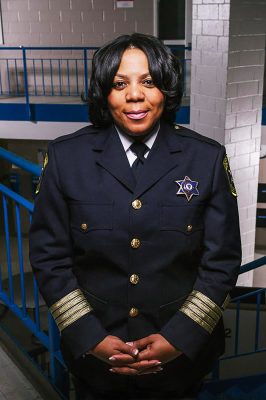
Yolanda Smith, the superintendent of the Suffolk County Sheriff’s Department, has wanted to work in criminal justice since she was a teenager.
Smith, who was born in Savannah, Georgia and moved to Lynn at age 13, wrote in an email to The Daily Free Press that she grew up in diverse communities where she learned to judge people based on their values and morals as opposed to what they look like. Smith has carried this lesson with her throughout her career in the Sheriff’s Department.
“Our staff continues to become more diverse every year,” Smith wrote. “We put strong emphasis on cultural diversity and it is our belief that our difference are in fact our strengths as a department.”
Ever since high school, Smith has wished to pursue a career in criminal justice.
“I have always been an advocate for people who were/are under recognized,” Smith wrote.
While attending Northeastern University and Liberty University, Smith concentrated in criminal justice and English, and she was inspired to do so because of her parents’ influence.
“I think my parents set the stage for me to become a public servant,” Smith wrote. “My [p]arents instilled in my sisters and me early that we were to try to always find the good in everyone.”
Smith wrote that her involvement with the Suffolk County Sheriff’s Department first began in 1995. Since then, she’s held a variety of positions within the department, including correction officer, corporal, lieutenant, shift commander, assistant deputy superintendent, director of training, assistant superintendent and now superintendent.
During the early stages of her career, Smith wrote that she encountered setbacks because she is a woman.
“Some of my colleagues told me to my face that women should not be allowed to work in prison/jail atmospheres,” Smith wrote. “Hearing that only fueled my fire to work harder and more critically to show that I deserved to be in corrections.”
Supported by mentors include Suffolk County Sheriff Steve Tompkins and former Massachusetts Secretary of Public Safety Andrea Cabral, Smith said she was learned a lot since she started her career.
“[Cabral] reminded me often to be always be a critical thinker,” Smith wrote. “She always stood up for what was right and for what was in the best interest of [everyone]. [Tompkins] has also allowed me the opportunity to grow in my role as the Superintendent at the House of Correction. I am thankful to him for pushing me to see more and do more for our clientele.”
Smith’s current position in the Sheriff’s Department entails overseeing incarcerated individuals, and she wrote that she feels privileged to have the ability to watch them develop.
“I get the opportunity to watch many of our folks engage in school, in our vocational track, in civics, in job skill classes,” Smith wrote. “There is great reward in watching the men and women flourish.”
Smith stressed that the general public should not view those in custody with implicit bias and encouraged the community to look at everyone holistically.
“We need the community, providers, religious organizations, the police, employers, probation, parole, and judges to recognize that the continuum of care must be in place post incarceration and collaborative efforts are paramount in our success,” Smith wrote.














